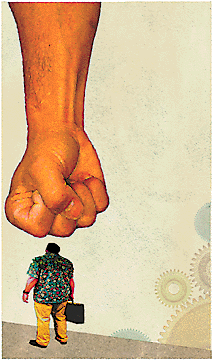

Battle to curb
overtime is a never-
ending struggle
Last fiscal year, the state
By Jaymes K. Song
spent $37.1 million on
overtime pay and the city
dished out $22 million
Star-BulletinWhen Felix Limtiaco was named to head the city's wastewater department in 1994, he found so much overtime was being claimed -- some of it unnecessarily -- that he issued a moratorium. Limtiaco had to approve any exceptions.
"I wasn't very popular," said Limtiaco, who left the city post in 1996. While the majority of the employees were hard-working and productive, he said, some were needlessly racking up overtime.
"These people didn't do the job in their eight-hour day and then stayed extra hours to do work they should have done in those eight hours," he said.

Many government officials say overtime and sick-leave abuse is a costly problem in the public sector.However, not many department heads seem to know how big the problem is, leaving the door open for continued abuse.
Last fiscal year, the state spent $37.1 million in overtime pay. The city spent $22 million.
For the state and city, it's too difficult to quantify how much overtime is from abuse or waste. According to the city it is "undeterminable."
Last month, Mayor Jeremy Harris asked the Honolulu Police Department to aggressively eliminate overtime waste. HPD has exceeded its overtime budget by an average of almost $4 million in the past two fiscal years.
The department said 35 percent of its overtime budget goes to fill vacant officer positions.
Police Chief Lee Donohue said that although the overtime budget is exceeded, money saved from the salaries from vacant positions was used to supplement the difference, part of a strategy implemented when the department was short 300 officers in 1995.
"Waste? I don't think so," Donohue said. "The overtime was earned. These people took time away from their families to provide a service to the community."
Although HPD spends more overtime than is allocated, the department comes within budget every year, Donohue said. The department has not asked the city for any supplemental funding.
With the overtime pay to compensate for the officer shortage, HPD was able to make significant reductions in crime in the past two years, he said.
Donohue said overtime is critical in police work because of the shifts that stay late due to unpredictable crimes, accidents or court appearances.
But to cut down on overtime, patrol districts have been ordered to give overtime budget reports weekly instead of monthly.
And instead of distributing all the overtime funds to the districts once a year, the funds will be given quarterly.
The State of Hawaii Organization of Police Officers doesn't believe officers are abusing overtime.
"The department is trying to cut back every way they can and the officers are just doing their job," said Sgt. Richard Wheeler, Oahu chairman of SHOPO.
Another issue that has drawn some attention is government employees having their overtime pay calculated into their retirement benefits. Employees could collect large amounts of overtime to pad their retirement, since it is based on the highest three years of income made.
"We really need to look at that," said House Majority Leader Tom Okamura. "That defeats the purpose for overtime. A number of people called me and told me that it is very political, who gets chosen for the overtime. Your retirement benefits and pay could be drastically higher. And I think it's abusive and we need to cut it out.
"I have nothing against people being paid overtime, but it should not be calculated in the retirement."
At the state Department of Public Safety, it was abuse of sick leave, not overtime, that was costing the state. Officials estimate that sick-leave abuse cost about $2 million to $3 million annually.
In the past year, about 10 percent of the 1,000 prison guards were disciplined for sick-leave abuse. Nine Adult Correctional Officers were fired, according to the department.
The department has attempted to crack down by tripling the number of investigations into sick-leave abuse, causing some employees to quit, said Keith Kaneshiro, former director of the department.
The crackdown has resulted in many grievances being filed. In the past, the agency sometimes sidestepped taking such aggressive action if managers anticipated having to fight many grievances, he said.
"I think sometimes the department backed off because it was too long a process, too long a battle," said Kaneshiro, who resigned last month. "It's very, very difficult to fire a worker."
Star-Bulletin reporter Rob Perez contributed to this report.